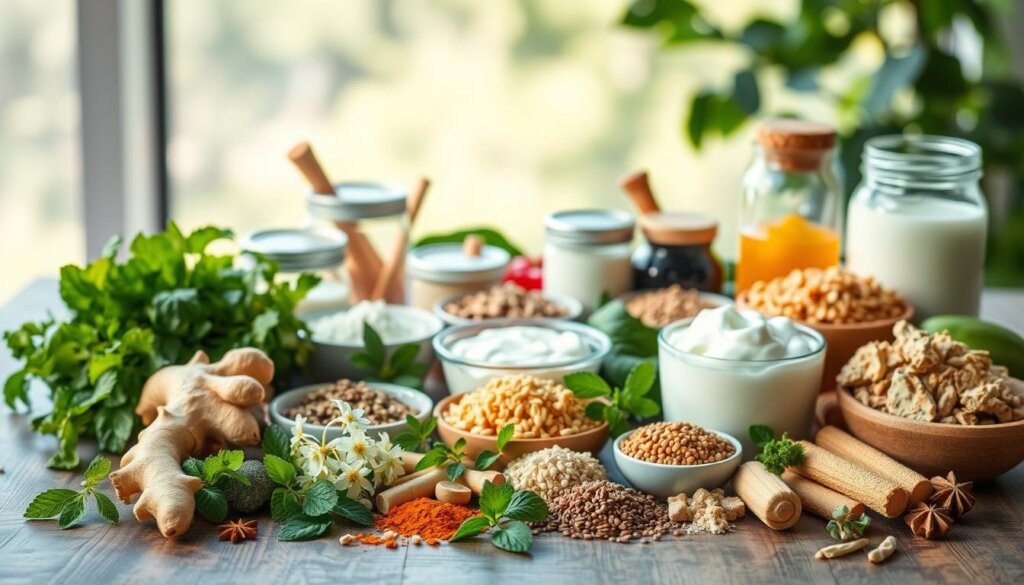Did you know 1 in 3 Malaysians report persistent stomach discomfort after meals? This common issue often stems from busy schedules, rushed eating habits, and processed food consumption. The digestive system faces immense pressure when overloaded, leading to symptoms like bloating and sluggishness that disrupt daily life.
Many people underestimate how modern diets strain their bodies. Heavy meals stretch stomach tissues while triggering excessive acid production. Over time, this cycle can create ongoing discomfort that simple antacids can’t resolve. Addressing these challenges requires more than temporary fixes—it demands holistic support for the entire digestive process.
Natural approaches are gaining attention for their ability to target root causes rather than just masking symptoms. By combining scientifically backed ingredients with lifestyle adjustments, individuals can restore balance to their gut health. For those seeking guidance, the Wellness Group offers personalized consultations via WhatsApp at +60123822655.
Key Takeaways
- Digestive discomfort affects millions globally, with dietary habits playing a key role
- Modern lifestyles contribute to increased strain on the digestive system
- Comprehensive solutions outperform temporary symptom management
- Natural methods can address underlying causes of stomach issues
- Professional support enhances outcomes for lasting digestive wellness
Understanding Post-Meal Heaviness and Indigestion
Ever wonder why some meals leave you feeling like you swallowed a bowling ball? That lingering discomfort isn’t just about what you ate—it’s how your body processes food. Recognizing patterns in digestive responses helps pinpoint solutions for lasting relief.
What Does Digestive Discomfort Feel Like?

Click to LEARN MORE
Many experience a tight, swollen abdomen after eating—like wearing pants two sizes too small. Some report sharp stomach pain creeping up an hour after meals. Others feel full after just a few bites, their appetite vanishing despite minimal food intake.
These symptoms often travel in packs. Bloating might team up with acid reflux, creating a burning sensation behind the breastbone. For 15-20% of adults, these issues cross into dyspepsia territory—persistent discomfort that disrupts daily routines.
Roots of the Problem
Three main culprits fuel post-meal distress. Eating habits top the list—wolfing down spicy foods or oversized portions stresses the digestive system. Second, imbalances in acid production can erode the stomach’s protective lining.
The third factor involves nerve sensitivity. In functional dyspepsia, normal digestive movements feel like distress signals. Imagine hearing fireworks when someone’s just popping bubble wrap—that’s how hypersensitive guts misinterpret routine processes.
Wellness Group experts note: “Identifying your unique triggers requires patience. Our team helps Malaysians map their symptoms to specific causes during consultations.” Available weekdays 9:30 AM–6:30 PM and weekends 10 AM–5 PM.
Overview of TrioGut for post-meal heaviness and indigestion
Modern digestive care now offers alternatives that work with your body rather than against it. These approaches consider multiple factors contributing to discomfort, from enzyme activity to gut motility. This shift addresses the full spectrum of digestive needs rather than isolated issues.

Multifaceted Relief Approach
Unlike single-target treatments, comprehensive formulas support three key digestive phases. They enhance nutrient breakdown during digestion while promoting smoother food movement through the system. This dual action helps reduce common symptoms like abdominal pressure and delayed emptying.
Research shows combining digestive enzymes with gut-soothing botanicals yields better results than acid suppression alone. One study found 68% of participants reported improved comfort within two weeks of using multimodal support systems.
Beyond Acid Control
Proton pump inhibitors (PPIs) remain popular for managing acid-related stomach issues. However, these medications primarily target acid pumps without addressing other contributors to dyspepsia. Long-term PPI use might even affect nutrient absorption in some individuals.
Holistic alternatives take a different path. Instead of blocking natural processes, they optimize digestive function through:
- Enzyme enhancement for better food breakdown
- Gut lining support for improved nutrient absorption
- Microbiome balancing to reduce fermentation-related bloating
“True digestive wellness requires addressing the root causes, not just symptoms. Our team helps patients understand their best options.”
For Malaysians exploring alternatives to proton pump inhibitors, personalized guidance makes decision-making easier. The Wellness Group offers free consultations through WhatsApp at +60123822655 to discuss individual needs.
Navigating Treatment Options and Medications
What works best for digestive relief? The answer varies—effective solutions often combine multiple approaches tailored to individual needs. Treatment plans may include simple daily adjustments or specialized therapies, depending on symptom severity and underlying causes.
Lifestyle Changes That Make a Difference
Small daily shifts often yield big improvements. Try these evidence-based strategies:
- Chew food thoroughly—aim for 20-30 bites per mouthful
- Walk 10 minutes after meals to stimulate digestion
- Identify trigger foods through a food journal
Research shows combining these habits reduces bloating in 60% of cases. For those seeking structured support, the Wellness Group’s colon detox program helps reset digestive patterns through guided dietary changes.
When Medications Become Necessary

Click to LEARN MORE
Over-the-counter options work for occasional discomfort:
- Antacids neutralize stomach acid quickly
- H2 blockers reduce acid production for 8-12 hours
Doctors may prescribe stronger medications if symptoms persist. Proton pump inhibitors (PPIs) or prokinetics help manage chronic conditions like GERD. Always consult healthcare providers before starting new treatments—they assess risks and benefits based on your unique health profile.
“Combining lifestyle modifications with targeted therapies creates lasting results. Our team helps patients find their ideal balance.”
Remember—persistent symptoms might signal underlying conditions needing professional evaluation. Malaysian residents can contact Wellness Group specialists at +60123822655 for personalized guidance.
Diet, Lifestyle, and Natural Remedies for Indigestion Relief
What if simple changes to your plate could ease that post-lunch slump? Smart food choices and mindful routines often make the biggest difference for digestive comfort. Let’s explore practical ways to support your body’s natural rhythms.

Food Habits to Reduce Stomach Heaviness
Start by rethinking meal timing. Eating smaller portions every 3-4 hours prevents overloading the digestive tract. Those who experience reflux often find relief by avoiding late-night snacks and acidic foods like tomatoes.
Chew slowly—it’s free digestive support! Breaking down food thoroughly reduces strain on the small intestine. Swap carbonated drinks for herbal teas, and limit fried dishes that delay stomach emptying. Many people discover hidden triggers through elimination diets, particularly for common irritants like dairy or gluten.
Herbal Remedies and Alternative Approaches
Nature’s pantry offers options worth exploring. Peppermint tea may calm muscle spasms in the gut, while ginger helps speed up sluggish digestion. Chamomile’s anti-inflammatory properties could ease that burning sensation some experience after meals.
Recent studies suggest combining these herbs with probiotics for gas management yields better results. However, research remains mixed—what works for one person might not help another. Always consult professionals before trying new supplements.
Wellness Group nutritionists note: “Sustainable lifestyle changes work best when paired with personalized strategies.” Their team helps Malaysians create meal plans that align with both preferences and digestive needs.
When to Seek Professional Healthcare Advice
Your body sends signals when something needs attention—learning to recognize urgent ones can make all the difference. While occasional discomfort happens, certain patterns demand professional evaluation.
Identifying Warning Signs
Sharp pain in the abdomen that feels like a knife stab requires immediate care. Blood in vomit or black stools often points to internal bleeding—a potential disease complication. Difficulty breathing or chest tightness alongside stomach issues could signal heart problems.
Watch for high fever with digestive symptoms. These often indicate infections needing antibiotics. Persistent nausea lasting weeks might reveal peptic ulcer disease or other conditions. Don’t ignore gradual weight loss paired with chronic indigestion—it could flag serious underlying issues.
The Importance of Medical Consultation
Healthcare providers use tools like endoscopies to diagnose causes of ongoing discomfort. “Many patients delay visits until symptoms become unbearable,” notes a Kuala Lumpur gastroenterologist. “Early checks prevent complications from chronic indigestion.”
Doctors assess family history and lifestyle factors during evaluations. They might order stool tests or imaging scans to rule out disease. For suspected peptic ulcer disease, treatment combines medications with dietary changes.
Wellness Group specialists advise: “If home remedies don’t help within three weeks, consult a healthcare provider.” Their team assists Malaysians in understanding when to visit clinics versus hospitals. Available weekdays 9:30 AM–6:30 PM and weekends 10 AM–5 PM via WhatsApp at +60123822655.
Managing Symptoms with a Healthy Routine
What separates temporary fixes from lasting digestive comfort? Building consistent habits proves crucial for managing chronic functional dyspepsia and related conditions. Unlike quick remedies, sustainable routines address recurring symptoms while supporting overall health.
Daily Habits for Long-Term Relief
Tracking meals and abdominal pain patterns helps identify personal triggers. Try these strategies:
| Symptom Trigger | Healthy Habit | Benefit |
|---|---|---|
| Acid reflux | Elevate head during sleep | Reduces nighttime reflux disease flare-ups |
| Early satiety | 5 small meals daily | Eases stomach pressure |
| Functional dyspepsia | Stress-reduction techniques | Improves gut-brain communication |
Research shows combining dietary changes with activity boosts reduces dyspepsia episodes by 47%. Gentle exercises like yoga improve digestive tract motility. Those with peptic ulcer disease often benefit from avoiding NSAIDs and acidic foods.
Contact Wellness Group and Availability
Persistent symptoms require professional insight. Wellness Group specialists help Malaysians create personalized plans addressing:
- Diet modifications for reflux disease
- Stress management techniques
- Medication compatibility checks
“Consistency transforms digestive health. Our team guides clients through sustainable changes that fit their lifestyles.”
Reach nutritionists and gastroenterologists via WhatsApp at +60123822655. Available:
Weekdays: 9:30 AM–6:30 PM
Weekends: 10 AM–5 PM
Conclusion
Finding lasting relief from digestive discomfort requires understanding its layered nature. Functional dyspepsia often involves complex interactions between diet, stress, and gut sensitivity. While medical tests help identify causes, many cases benefit from personalized strategies rather than universal solutions.
Managing persistent symptoms like bloating or stomach pain demands a multi-pronged approach. Lifestyle adjustments, mindful eating, and targeted support for the digestive system often work better than temporary fixes. For some, reducing acid triggers or balancing medications becomes key to comfort.
The Wellness Group’s specialists help Malaysians navigate these choices. Their team combines expertise in healthcare with practical guidance for daily routines. Those struggling with unexplained dyspepsia or recurring indigestion can access free consultations via WhatsApp at +60123822655.
Available:
Weekdays: 9:30 AM–6:30 PM
Weekends: 10 AM–5 PM
FAQ
What are common signs of post-meal digestive discomfort?
People often experience bloating, abdominal pain, or a burning sensation in the upper abdomen after eating. Some may also feel overly full quickly (early satiety) or notice excessive gas. These symptoms can signal conditions like functional dyspepsia or acid reflux.
How do proton pump inhibitors differ from natural digestive aids?
Proton pump inhibitors (PPIs) reduce stomach acid production, which helps manage conditions like peptic ulcer disease. In contrast, products like TrioGut focus on supporting healthy digestion through ingredients that ease heaviness without suppressing acid long-term. Always consult a healthcare provider before choosing treatments.
Can lifestyle changes really improve chronic indigestion?
Yes! Smaller meals, avoiding trigger foods like spicy or fatty dishes, and eating slowly can reduce strain on the digestive tract. Stress management and regular exercise also promote smoother digestion, complementing therapies like TrioGut or prescribed medications.
When should someone see a doctor for stomach issues?
Persistent symptoms—such as unexplained weight loss, severe pain, or vomiting—require immediate medical attention. A healthcare provider can check for underlying causes like peptic ulcers or gastroesophageal reflux disease (GERD) and recommend tailored treatments.
Are herbal remedies safe for managing indigestion?
Ginger, peppermint, and chamomile are popular for easing bloating and discomfort. However, their effectiveness varies, and they may interact with medications like PPIs. Discuss alternatives with a doctor to ensure they align with your health needs.
How does chronic stress affect digestive health?
Stress disrupts gut function, often worsening symptoms like abdominal pain or irregular bowel movements. Incorporating relaxation techniques, such as deep breathing or yoga, can help stabilize the digestive system and improve overall well-being.
What role does diet play in preventing stomach heaviness?
High-fiber foods, lean proteins, and probiotics support gut health, while processed items or carbonated drinks may trigger discomfort. Eating mindfully and staying hydrated also help the digestive tract function smoothly, reducing post-meal issues.






